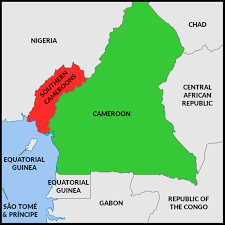CAMEROON’S ANGLOPHONE CRISIS- NICOLE BALLAN, CAMEROON – TRANSLATION BY FRANCESCA GROSSI
- makfor9
- May 31, 2021
- 2 min read
Having lived in Cameroon for many years, I have been indirectly witnessing the difficulties that this country is going through, especially the conflict between the anglophone territory and the Cameroonian government. I decided to write an article on this subject because this crisis receives little attention by western media and it is often covered up by the government. Let's start with a bit of history. In 1919, Cameroon was divided in two parts: the first, the largest, was administered under French mandate and the second under British mandate. Both colonising countries had extremely different legal and administrative cultures, which created a great difference between the two territories. In 1960, francophone Cameroon gained its independence: the northern anglophone part chose to join Nigeria and francophone Cameroon in the south. The United Republic of Cameroon was then established in 1972 comprising an anglophone and a francophone part. However, anglophone populations quickly started to
feel marginalised. They claimed independence from the Francophone system and greater access to oil that was being exploited in their region.
In 2016, strikes and demonstrations held by teachers and lawyers erupted in a bid to protect their cultural identity from the Francophones. In response, the government chose a repressive approach, sending the army to repress every
insurrection. The area was deprived of internet for more than three months. In 2017, Anglophone secessionists symbolically proclaimed the independence of the region, naming it Ambazonia. Not long afterwards, political leaders were arrested or forced into exile. This saw the establishment of armed groups who sought to boycott the francophone education system. Looting, destruction of villages, violent massacres and kidnappings threw the Anglophone territory into a state of considerable instability. In 2020, in Kumba (a city located in the Anglophone area), seven primary school pupils were killed by armed groups; students and families thus being terrorized. Anglophone populations no longer dared to go to school as they were afraid of losing their lives. Today, the dialogue between the government and anglophone populations is at an impasse, which is causing a social and political crisis in the country on the verge of civil war. Over four years, the conflict has caused more than two thousand deaths and destroyed hundreds of villages. According to the UN, more than six hundred thousand people have moved to Francophone cities like Douala and another sixty thousand to neighbouring countries. In conclusion, having spent all my school years in a French institute, I have always been made aware of
armed groups through antiterrorism training. Cameroon is barely able to handle the conflict which is not the only one it has to face. Islamic extremist groups at the northern border with Nigeria represent another major threat to the country.






Comments